Partners in Solving Surgical Challenges
Spotlight
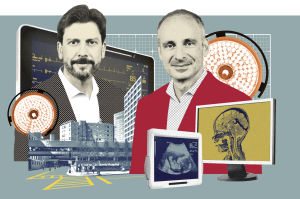
Dr. Darren Orbach (M.D. ’98, Ph.D.), left, and Dr. Peter Weinstock (M.D. ’98, Ph.D.)
Ask good friends and colleagues Dr. Darren Orbach (M.D. ’98, Ph.D.) and Dr. Peter Weinstock (M.D. ’98, Ph.D.) what lessons they gleaned from their time in Weill Cornell Medicine’s Tri-Institutional MD-PhD program, and a few common themes emerge: They learned how to be curious, flexible and think outside the box.
Their work together at Boston Children’s Hospital reflects how they’ve used those skills to solve complex surgical challenges.
In April 2023, Dr. Orbach, chief of neurointerventional radiology, and Dr. Weinstock, executive program director of the Immersive Design Systems (IDS) program, collaborated to successfully perform the first ever in-utero fetal intracranial surgery to treat a life-threatening Vein of Galen Malformation (VOGM). The condition occurs when the blood vessel carrying blood from the brain to the heart develops incorrectly and can result in brain injuries and immediate heart failure after birth.
“Usually babies with VOGM are born and get very sick at the NICU,” says Dr. Orbach. “There are physiologic reasons to believe that it is better to treat them in utero and try to avoid them getting sick in the first place, which is why we designed this clinical trial.”
Uniquely housed within a hospital setting, IDS creates innovative models on the spot — speeding solutions directly to patients’ bedsides.
“Our goal is to create the best possible outcomes and the strongest program for patients and their families,” says Dr. Weinstock. “We use simulations to make sure we’re getting it right, and we’re optimizing every step of the process.”
Using models designed by Dr. Weinstock’s IDS team, Dr. Orbach was able to simulate the complex procedure and receive expedited FDA clearance to perform in-utero surgery on Denver Coleman of Baton Rouge, La.
During the VOGM procedure, surgeons need to carefully drill through the fetal skull in-utero, which requires extreme precision and control — best practiced ahead of time in a simulation. For Denver’s surgery, Dr. Weinstock’s team designed a fetal brain phantom, which simulates tissue and vascular targets in the brain, and fetal skull trainers, which model the fetal skull with varying degrees of thickness and hardness. Denver, now 15 months old, is thriving.
“It’s been an incredible joy to work with Darren,” says Dr. Weinstock. “We pinch ourselves that we are here collaborating.”
The VOGM procedure has been performed three times to date, and so far, the “early results [of the clinical trial] look fantastic,” says Dr. Orbach. “I’m very hopeful.”
Summer 2024 Front to Back
-
Features
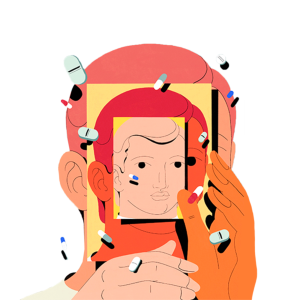
Science Over Stigma
By probing the physical cause of obesity, researchers have repudiated harmful misconceptions, leading to new, highly effective medications. -
Features

The Sounds of Science
How insights from ornithology, coupled with advances in AI, could enable doctors to screen for disease using the human voice. -
Features

Bones’ Secret Cells
Research led by Dr. Matthew Greenblatt and his lab is revealing connections between bone stem cells and a surprising array of conditions — including cancer. -
Notable

Expansion in Midtown
A 216,000 square-foot expansion of clinical and research programs at 575 Lexington Ave. will provide state-of-the-art clinical care at the Midtown Manhattan location. -
Notable

A Dramatic Growth in Research
In the decade since the Belfer Research Building’s opening, Weill Cornell Medicine’s sponsored research funding has more than doubled. -
Notable

Dateline
Heart disease presents differently in resource-poor countries like Haiti. Dr. Molly McNairy and colleagues are working to identify underlying causes and prevention. -
Notable

Overheard
Weill Cornell Medicine faculty members are leading the conversation about important health issues across the country and around the world. -
Notable

News Briefs
Notable faculty appointments, honors, awards and more — from around campus and beyond. -
Grand Rounds
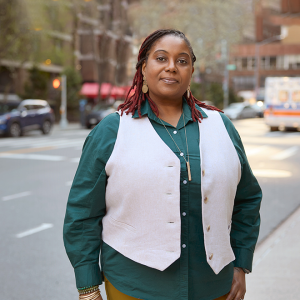
Living With Endometriosis: A 12-Year Journey
How the right treatment reduced the pain of endometriosis -
Grand Rounds
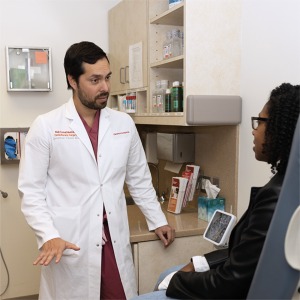
Taking Action Against Lung Cancer
Monitoring by Weill Cornell Medicine’s Incidental Lung Nodule Surveillance Program can lead to early cancer detection. -
Grand Rounds

News Briefs
The latest on teaching, learning and patient-centered care. -
Discovery

Gut Check
New evidence shows that a bacterium found in the gut of livestock could be a trigger of multiple sclerosis in humans. -
Discovery

Researchers Chart the Contents of Human Bone Marrow
A new method for mapping the location and spatial features of blood-forming cells within human bone marrow provide a powerful new means to study diseases that affect it. -
Discovery
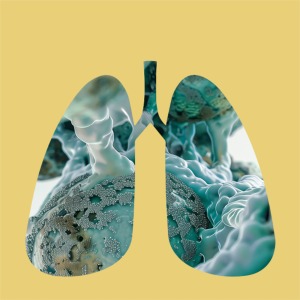
Findings
The latest advances in faculty research, published in the world’s leading journals. -
Alumni
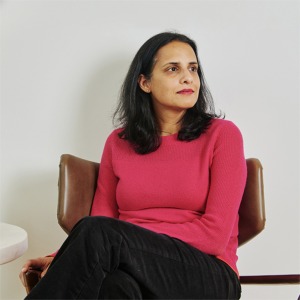
Profiles
Forging critical connections to move research from the bench to the bedside, our alumni are making an impact. -
Alumni

Notes
What’s new with you? Keep your classmates up to date on all your latest achievements with an Alumni Note. -
Alumni

In Memoriam
Marking the passing of our faculty and alumni. -
Alumni
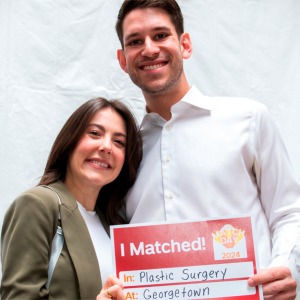
Moments
Marking celebratory events in the lives of our students, including the White Coat Ceremony and receptions for new students. -
Second Opinion

Equal Risk
Does race have a role in calculations of health risks? -
Exchange

Health Equity
Two faculty members discuss the importance of community-engaged research in their work to help combat cancer disparities fueled by persistent poverty. -
Muse

Finding Strength in Art
Surin Lee is a Weill Cornell Medicine-Qatar medical student, Class of 2026, and a visual artist. -
Spotlight

Partners in Solving Surgical Challenges
Dr. Darren Orbach (M.D. ’98, Ph.D.) and Dr. Peter Weinstock (M.D. ’98, Ph.D.) are pioneering the use of practice simulations to ensure successful complex surgeries.